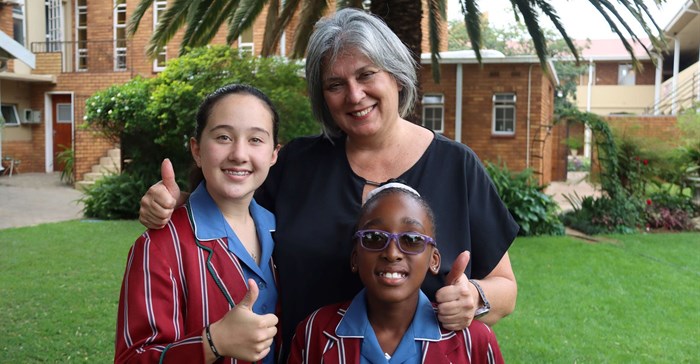Holy Rosary School for Girls in Johannesburg has just completed a voluntary 40-day phone-free challenge that encouraged Grade 1 to 7 pupils to abstain from using their smartphones.

Source: Supplied. Holy Rosary pupils with principal Meerholz.
The initiative took place from 14 February to 31 March during the month of Lent.
During this period, the participating primary-school students were challenged to keep their phones completely powered off at all times, refraining from any social-media logins.
The uptake was unexpectedly high with 76% or 129 of the Grade 4 to 7 girls pledging their support. With far fewer Grade 1 to 3 pupils owning a smartphone – the majority participated by pledging to reduce their TV and screen time.
With the 40-day goal now reached, the school reports that 44% of the girls managed to complete the full 40 days, not accessing their device at all. A total of 28% managed to stick to it most of the time with a few cheat days, while over 5% could not meet the challenge; 23% who pledged don’t own phones but indicated they wanted to support the school and their friends.
The initiative, believed to be the first of its kind in South Africa, was a bold and disruptive first step in a far bigger campaign the school is driving – Smart Age for Smartphone. The campaign is calling for the delay of smartphone ownership in children in a bid to restore a play-based childhood and to protect the mental health and wellbeing of its learners.
Boundaries for smartphone usage
While the ideal age for smartphone ownership is as late as possible – 14 is being suggested as the earliest children should be given the device - with no social media until 16. Globally, however, the increase in smartphone usage accelerates around the age of 10.
Principal Natalie Meerholz, the driving force behind the campaign says, “Parents tend to overestimate the dangers of the ‘real world’ and underestimate the dangers of a smartphone. Children have more information at their fingertips than ever before.
"They are more exposed to a world of mystery and wonder, but also to more inappropriate content and physiologically, their brains are not able to cope with what they see.”
Meerholz adds that although the female Alpha generation (born after 2010) appears feisty and confident, they are still little girls. “What young girls value the most is connection, to belong, to be listened to and be heard - and to know they are enough. They need boundaries to feel safe and in control – even if they don’t think so.”
Social-media legislation
The school’s campaign, which has been publicly supported by social media law specialist, Emma Sadleir, coincides with newly published legislation that makes social media unlawful for children under 14 in Florida (USA). That means no more TikTok, Snapchat, Facebook or Instagram (IG) for children aged 14 and under; 15-year-olds need parental consent to have a social-media account.
Concerned at the increasing cyber-bullying and inappropriate behaviour, particularly on WhatsApp, with “spats and fall-outs” among pupils often extending late into the night, early morning and filtering into school the next day, Meerholz conducted a survey of pupils in Grades 2 to 7.
The results mirror global trends, indicating that 60% of pupils have access to a smartphone, with numbers accelerating in Grade 4, and culminating in 98% of the Grade 7 girls surveyed owning a smartphone.
“The peer pressure around smartphone ownership is high. It makes parents feel powerless – often believing their children will be left out and they therefore give in to this pressure at a very young age – sometimes as early as Grade 0,” says Meerholz. “The knock-on effect is childhoods are no longer play-based. Children are starved of play and real connection.
“It’s a well-known fact that Steve Jobs limited his own children’s access to smartphones and it’s been widely reported that Bill Gates didn’t allow his kids to have smartphones until they were 14 - with a cap of just 45 minutes a day on their devices.
Both names are synonymous with the technological revolution yet they recognised the dangers of early and excessive exposure to these devices. If these pioneers saw the dangers and took steps to limit their children’s exposure - we urgently need to do the same,” says Meerholz.
Smartphone impact on mental health
The school’s commitment to driving this change has also been fuelled by scientific findings that are heavily supporting the fact that smartphone usage is an accelerator of mental-health issues in children and even more so in young girls.
Meerholz says that statistics released by the South African Depression and Anxiety Group (Sadag) in 2022 show that an alarming 9% of all teenage deaths in SA are suicides. One in five South African high-school learners have tried to take their own lives – and this figure is climbing.
“While we cannot solely attribute all instances of suicides to social media and smartphones, global research is drawing parallels and highlighting negative associations that demand serious attention.”
Reinforcing this, American social psychologist and author, Jonathan Haidt has published several papers and books on the subject. He draws correlations between the increase in depression, anxiety and self-harm in adolescent girls with the proliferation of social media - particularly IG.
His publications indicate that apps like IG, which portray unrealistic images of beauty, can loom in a girl’s mind, driving hours of obsessive thought, worry and shame.
This is not the case for boys who spend more time playing video games and don’t spend hours stressing about what other players are saying about them when they step away from the console.
At the start of the 2010s when IG launched, rates of teenage mental illness took a sharp upward turn, and they have been rising ever since.
“Science also suggests that young brains, tweens and teenagers have a high susceptibility to rewards. High levels of dopamine are released with the thought of what message/likes/attention they might receive, not what they do receive.
"This can lead to addictions and both our parents and teachers alike are constantly complaining that children are addicted to their devices,” says Meerholz.
Phone-free benefits revealed
During the 40-day phone-free challenge, some students volunteered to journal and anonymously share their experiences. Initial feedback shows that children found themselves bored, not knowing how to occupy their time.
Meerholz says this isn’t a bad thing because children who are allowed to experience boredom are more creative and innovative. “They are forced to either learn a new skill, create something new, or think outside the box, and it was our hope that the campaign would push this to happen.”
Although it was challenging for many of the girls, they reported better quality sleep during the 40 days, feeling less tired, irritable and generally happier.
Interaction among family members intensified, leading to more profound and meaningful conversations while increased conflict was perceived positively, as it signalled a shift from previous disengagement to genuine connection and effective conflict resolution.
New hobbies were explored, including reading, knitting and baking with a marked increase in self-discipline, and less procrastination was reported.
It was not only pupils who participated in the 40-day challenge with 88 adult members of the community pledging to give up an app or limiting usage, or phone-related activity.
Jaime-Lee Jacobs and Bukhobethu Matyeni 26 Jan 2024 A group of these parents also answered questions on a weekly basis, noting their personal experience and the behaviour of their daughters. Once all the data has been analysed the school will publish a full report on the findings.
“Our goal is for parents to feel no pressure to purchase phones - but this can only be achieved if the community stands together. Initiatives like our Phone-Free 40 Days challenge contribute significantly to nurturing healthy and balanced childhoods in a digital age.
"We need to get our pupils off their phones and into the world so that they can grow into capable, confident, engaged, and happy adults. Our initiative is just the start of this process,” concludes Meerholz.
The new cyber laws recently passed in South Africa, set criminal liability at the age of 10 - it only takes one person to decide to prosecute. Holy Rosary is hoping that by delaying giving their children smartphones – parents will realise they are in fact protecting their children and placing a premium on their social and emotional wellbeing, thus offering vital support.





































